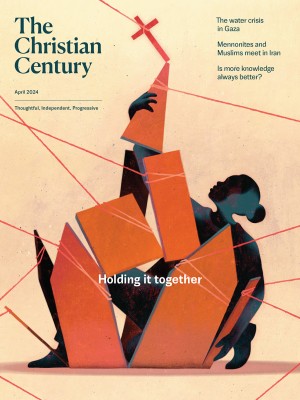Ministry and other difficult jobs
Pastors face intense challenges—though not necessarily unique ones.

(Illustration by Owen Gent)
Is there a pastoral version of the Great Resignation unfolding? If so, most people seem certain that it has to do with the unique challenges pastors face. Americans don’t attend church in the numbers or with the enthusiasm they once did. Our polarized political culture constrains pastoral freedom in the pulpit. Congregations struggle to offer adequate compensation to support national searches, long hours, and even simply making ends meet. Nonstop caring for people sucks the emotional well dry. In hushed tones at conferences and denominational meetings, pastors tell one another that these resignations are due to the unique challenges of pastoral ministry, often with the implication that meaningful work with better pay is just around the corner in other fields or for other people.
Perhaps this is a necessary fiction. An exhausted traveler needs to believe that there is rest on the other side of the next hill—and pastors are exhausted. But something necessary is not always true or ultimately helpful. Pastors, we suspect, are not that special—neither in their desire to make a meaningful contribution nor in their exhaustion. The challenges they face in their work are not terribly different from those crushing other helping, caring, and hospitality professions in the United States. Culture war madness, low pay and rising prices, lack of boundaries, ineffectual support and self-care—these issues characterize everything from public school teachers to nurses to service industry workers. Those who leave ordained ministry might find themselves jumping from the frying pan into the fire.
Read our latest issue or browse back issues.
While pastoral quit rates do not stand out from other fields, several studies show worrying trends in pastoral attitudes toward the ministerial vocation. One Barna study found that 40 percent of pastors considered leaving full-time ministry in 2022, up from 29 percent in 2020. It’s an alarming number, but it passes the plausibility test. In church circles, we all know of congregations that lost pastors after the pandemic and clergy who have stepped into new careers. Those in ministry also know many clergy friends considering a move—and these stories seem more frequent than in the past.
But thinking about leaving and actually leaving are two different things. The Hartford Institute has found that, while the number of clergy considering a different career has increased by 16 percent from 2021 to 2023, the situation remains ambiguous and uncertain. Most of those reported as considering walking away have not yet done so. The data show a lot of talk about leaving. This would lead us to anticipate a mass exodus, but so far what we see is broad pastoral ambivalence alongside enough anecdotal evidence to suggest something is wrong.
And something probably is wrong. Ambivalence about the work doesn’t often make for a thriving ministry, even (or perhaps especially) if it is for understandable reasons. In recent years, pastors have been on the front lines of debates around masking and in-person services, vaccination status, and Christian nationalism. According to a 2023 survey by the Public Religion Research Institute, mainline pastors in particular often found themselves holding to different convictions than many people in their congregations on such issues. Anecdotal data reflect that recent attempts to help congregations find pastors have proven more difficult. In our clergy groups, we are receiving whispered confidences and out loud pronouncements: I don’t think I want to do this anymore and It seems like it would be easier to go work somewhere where I could just make a living.
Yet these challenges are not distinct from those faced by anyone working with people in a caring or service profession. Feeling unappreciated and unsupported is a symptom of a larger sickness: the fracturing of our social spaces in real time. More than that, both the quitting and the ambivalence reflect and result in deepening, system-wide problems, starting with a lack of trust and moving all the way to outright institutional and communal disintegration.
In The Undertow: Scenes from a Slow Civil War, Jeff Sharlet offers snapshots from his cross-country trek from Sacramento, California, to his home in New Hampshire. The journalist was in Sacramento to cover a rally for Ashli Babbitt, the 35-year-old woman shot to death by the Capitol Police while trying to climb through a window during the insurrection on January 6, 2021. After the rally, Sharlet set out in his rental car across the American heartland, stopping to ask conspiracy theorists, revivalists, megachurch pastors, and militia members the question, “How does a body come apart?”
Sharlet draws his book title from an evangelist he heard on Christian radio while driving through the mountains. The preacher described a scene in which his children were playing on the beach while he studied the Bible. He heard his wife shouting and looked up to see his three children fighting against the waves, being pulled out into deeper water. He described the feeling of running into the water while still wearing his jeans, being weighed down and restricted in movement. Sharlet kept waiting to hear what happened to the children, but the evangelist wanted to talk about his jeans. The jeans became a metaphor for the baggage that distracts us from God.
How does a society come apart? Like this. It is pulled apart in the slow, persistent tug of rival stories and experiences, pulling some of us out into the deep waters of conspiracy and vitriol. And those who might step into the undertow and pull loved ones back into a shared world aren’t noticing the rising seas on the horizon because they are thinking about their jeans, their own personal lack of agency; they are weighed down and losing the plot. Nearly every stranger Sharlet meets confirms his fear. They see (and in some cases hope for) a heroic role for themselves in an upcoming civil war. Sharlet discovers these divisions in multiple community spaces, at churches and at bars, in living rooms and along the side of the road. It is a book full of encounters with nice people and good neighbors who have become comfortable with, even compelled by, the heroism of violence.
Such social dynamics cannot help but shape the workplace, along with the congregation—which is also a workplace. The great resignation of pastors, therapists, social workers, and teachers is pulled along by the undertow, washed away like so many coastal dunes. These are forces that have been accumulating from well before the pandemic and January 6. Pastors, and the rest of us in human-facing careers, feel ourselves being carried along by forces we don’t fully understand, and somehow all people keep talking about is individual pairs of waterlogged jeans.
In Theories of Culture, theologian Kathryn Tanner describes Christian identity as a constructive and ongoing task. Despite our claims to set-apartness, we worship God in vernacular languages and with borrowed cultural materials. Even practices we think of as peculiar to Christian identity are shaped by the cultural materials and linguistic limitations of time and place. Being Christian in the world is not a given but a task of ongoing theological discernment, because ours is a faith centered on the radical insistence that the Word became flesh and dwells among us. The creatureliness of the church as the body of this human and divine Christ is good news both for us and for our world.
In his commentary on Acts, theologian Willie Jennings reflects on the scene where the resurrected Christ lounges at the table with his disciples and demonstrates the truth of his resurrection from the dead. Jesus presents himself to be touched. He shares in the physicality of the creature by sharing food and conversation around a table. Perhaps the church, Jennings says, also exists to be touched by the world. We are not set apart from the world, a theological tax-exempt status, but rather set apart for the world. The church is a sign of and witness to God’s new creation precisely in its ordinariness. Here is a people among us, who share in our creaturely and cultural limitations and who are touched by God; here is a community whose existence demonstrates the broad possibilities of God’s grace.
Of course, the grace of God manifest in a church community will make us odd and, at times, inconceivable to our neighbors. The cross, as Ephesians reminds us and Acts narrates, tears down various dividing walls of hostility that might seem self-evident in our cultural situation. Navigating these tensions is part of the messy discernment that is Christian faith and practice. But it remains that our existence as a people in a place, dependent upon and adaptive to and caught up in the lives of our neighbors, is the ground of our witness, the sign of God’s new creation, even the grace of the gospel.
We are caught in the great undertow pulling us away from one another. But it would be worse if we were on the beach reading our Bible. The problem is not our blue jeans. This is not a story about us, in the end, but rather about the context in which we are located. Pastoral anxiety is one way in which we are being touched by the world, a thread of solidarity with those in our congregations, neighborhoods, and cities. It is part of this collective exhale after a global pandemic and our increased awareness that our economy socializes risk and privatizes benefits, leaving more and more of us behind. It is part of a broken political system and failing institutions. It is part of the undertow making it more difficult to hear, find, or even see one another. There is grace in the fact that we are all in this together.
None of this sounds like good news. And at one level, it genuinely is not. Pastoral ministry, caring professionals, hospitality, human connection—all of these are and will be hard. The way ahead is uncertain. But any meaningful work at a time like this will reflect these features. We are at a particular historical moment when we, like so many others, are trying to discern a next faithful step. Our present sufferings offer particular experiences and cultural material for this discernment. We bear these sufferings in our bodies, not because we are unique but because we are creatures of this age and of this time, dependent upon the kindness of strangers and the grace of God.
The good news the quotidian pastoral struggle reveals is that we—pastors and church people—are called to be with the world in the way of Jesus. The pain the church is experiencing, the pain both the church and the world are visiting upon its leaders, is not unique—and so we are offered an opportunity for solidarity, for neediness, for the space to learn from others who are also doing caring, connecting, and community-building work. We are invited into the room where it is happening. We are not separate from the human, social, or economic concerns of embodied life. Indeed, as God in Jesus shows us, there is no joy in such separation. The good news of the saving love God has for God’s people is that we are called to be with each other, just as God has come in Christ to be with us. In and with Christ, we are called to share in the structures of our world—and removing ourselves from them robs us of our calling, our purpose, and our future. So perhaps even in this era of pastoral ambivalence, the church is where it is called to be, in the midst of these challenges with the rest of God’s people.





